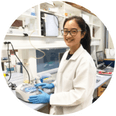Faces of FASEB
Making Science Fun and Hip
 Daisy Shu knows something about vision—she studies eyes. Nowadays, she trains her sights on boosting worldwide collaboration, speeding the spread of knowledge, expanding her brand, and making laboratory research more accessible, more fun … and even hip.
Daisy Shu knows something about vision—she studies eyes. Nowadays, she trains her sights on boosting worldwide collaboration, speeding the spread of knowledge, expanding her brand, and making laboratory research more accessible, more fun … and even hip.
“I like to encourage all my friends to be on social media because I think this is the new way of science,” says Shu, a postdoc research fellow at Schepens Eye Research Institute, Harvard Medical School-Mass Eye and Ear.
Since earning her doctorate in cell biology and anatomy at the University of Sydney, she has clicked her way to a global following as a much-liked digital lab rat.
Fluent in #hashtags and blogging, she boasts more than 12,000 Instagram followers and 3,000 on Twitter. On social media platforms and in her blogs, she writes about research triumphs and travails; offers tips about “emojifying” research and getting more out of conferences; and shares her creativity, like how to make a computer cursor that looks like a pipette. She’s also quick to post encouragement and celebrate colleagues and their accomplishments.
Here’s a sample tweet from March, among some 7,000 (so far): “So fantastic to hear that high school students were amongst the awardees at the @aopt15 #AOPT2021 meeting! Amazing to see such bright young minds already on the research path, working in labs and getting great mentorship!”
A native of Sydney, Australia, Shu studied optometry/vision at the University of New South Wales. While pursuing her bachelor’s degree, she was a peer mentor and member of the Touch Football Club and the Society of Dexterous Arts, a magicians’ organization.
Magic happened when Shu spent a summer at a research institute affiliated with the Sydney Eye Hospital.
“There was an eye bank there, so we actually got tissues—yeah, it was pretty gross—but it was pretty intense,” she says. “I was, like, super-inspired: ‘Oh, my God, I want to do this!’”
Trouble was, she had to pull a knowledge rabbit out of her postgraduate hat.
“I literally had zero concept of what a cell was. Basically, I didn’t even know what an antibody was,” she recalls.
At the University of Sydney’s Lens Research Laboratory, she studied under the tutelage of Frank Lovicu, PhD. Of her mentor, she says, “Frank has taught me so much—I couldn't even imagine—so much about the world of research, about biology, cellular, molecular stuff.”
Later, she harnessed the worldwide web to crowdfund her doctoral project about cataracts, raising $630 more than her goal of $2,000.
These days, she says, as journals and medical publications increasingly tweet links to papers and scientists participate in what could be considered akin to co-writing in fanfiction, she also enjoys swapping studies and stories.
Through her blogs and in her posts and tweets, she says, “I always feel more connected to my research and to others. Yes, they do have to take out the hazardous-waste bins, or they do have to fill up the pipette tip boxes, they all have to go feed their cells again on the weekend.”
Affable, funny and ebullient, she comes across Zoom as an enthusiastic e-mentor always just a click away. She also believes in the internet’s power to help level the playing field.
“Funnily enough, I believe social media is a catalyst for encouraging more women to get into STEM because there are more female scientists out there on social media than men,” she says, estimating that only 20 percent of her online followers are men.
That makes sense, seeing as how she was among so few women in her undergrad and postgraduate courses. She points out, with no small pride, that Schepens’ director of research is a woman: Patricia A. D'Amore, the Charles L. Schepens Professor of Ophthalmology and, among other role-modeling work, a FASEB Journal contributor.
Asked if hanging out in cyberspace is a distraction from, say, feeding her cells, Shu says she enjoys stepping away from her work from time to time. Beyond that, she says she thinks the scientific community is moving ever more quickly to a mainstream tweet spot.
“The sharing of knowledge,” she says, “that’s what I envision, just getting faster solutions, novel ideas out quicker, just feeding off each other because we all have something to contribute.”
Daisy Shu, PhD, is a member of the American Society for Investigative Pathology, a FASEB member society.